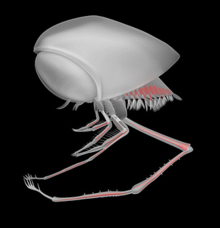| Clausocaris Temporal range:
| |
|---|---|

| |
| Reconstruction of Clausocaris lithographica | |
|
Scientific classification
| |
| Domain: | Eukaryota |
| Kingdom: | Animalia |
| Phylum: | Arthropoda |
| Class: | † Thylacocephala |
| Order: | † Conchyliocarida |
| Genus: | † Clausocaris |
| Species: | †C. lithographica
|
| Binomial name | |
| †Clausocaris lithographica Polz, 1989
| |

Clausocaris is an extinct genus of Thylacocephalan containing the single species Clausocaris lithographica from the Late Jurassic ( Tithonian) aged Solnhofen Limestone in Germany. [1] It was originally named Clausia by Oppenheim in 1888, but was later changed to Clausocaris. The morphology suggests a lifestyle of a mobile or ambush oceanic predator. [2]
Fossils have shown a carapace covering the bulk of its body, with compound eyes, possible gills, and also "raptorial appendages" controlled by "substantial striated muscles". [2]
- ^ Clausocaris at Fossilworks.org
- ^ a b Foote, Christopher (2014-08-22). "It's an eyeball with legs! Discovering more about the extinct, enigmatic and altogether bizarre Thylacocephlans". BMC Series blog. Retrieved 2019-09-21.
| Clausocaris Temporal range:
| |
|---|---|

| |
| Reconstruction of Clausocaris lithographica | |
|
Scientific classification
| |
| Domain: | Eukaryota |
| Kingdom: | Animalia |
| Phylum: | Arthropoda |
| Class: | † Thylacocephala |
| Order: | † Conchyliocarida |
| Genus: | † Clausocaris |
| Species: | †C. lithographica
|
| Binomial name | |
| †Clausocaris lithographica Polz, 1989
| |

Clausocaris is an extinct genus of Thylacocephalan containing the single species Clausocaris lithographica from the Late Jurassic ( Tithonian) aged Solnhofen Limestone in Germany. [1] It was originally named Clausia by Oppenheim in 1888, but was later changed to Clausocaris. The morphology suggests a lifestyle of a mobile or ambush oceanic predator. [2]
Fossils have shown a carapace covering the bulk of its body, with compound eyes, possible gills, and also "raptorial appendages" controlled by "substantial striated muscles". [2]
- ^ Clausocaris at Fossilworks.org
- ^ a b Foote, Christopher (2014-08-22). "It's an eyeball with legs! Discovering more about the extinct, enigmatic and altogether bizarre Thylacocephlans". BMC Series blog. Retrieved 2019-09-21.